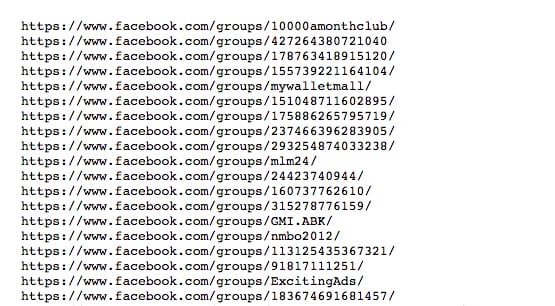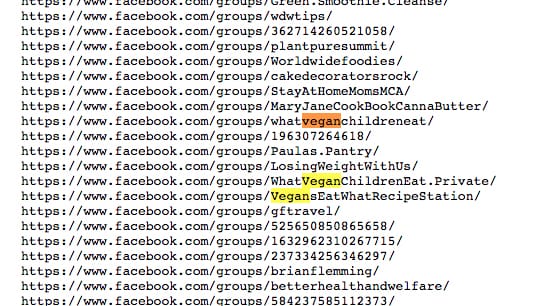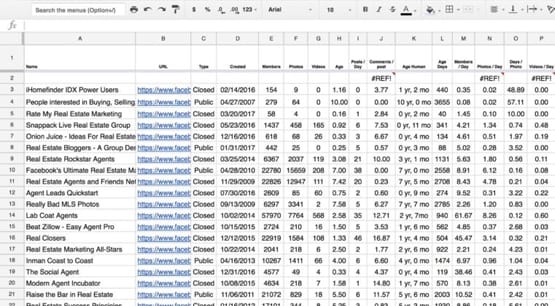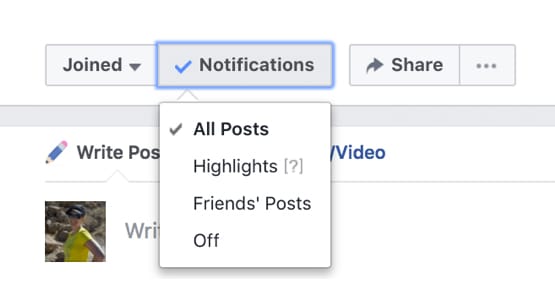Huge List of Active Facebook Groups to Post In
There’s more to marketing on Facebook than just the usual organic posts and paid advertising. There’s an entire section of Facebook you can use that surprisingly few marketers seem to notice. That section is Facebook Groups.
Now, Facebook Groups are harder to use, for sure. For one thing, you can’t just join them using your business account. You have to join them using a personal account, which means you’re putting yourself – or your social media manager – out there in a professional role. This means that, above all, your personal account needs to be kept professional.
What does that mean? No weird political rants, no flame war participation, nothing that would jeopardize your brand reputation. From the moment you decide to do this moving forward, you need to keep a presentable, professional profile. We’re talking something that looks like LinkedIn here. You should also seriously consider locking down your profile so only friends – or even just sub-groups of friends – are able to see your posts.
Now, before we really dig into the idea of marketing using Facebook Groups, I promised you a huge list of active groups. While I can’t verify that every single group is constantly active – and this list will probably decay over time – I did in fact make one. Here’s the raw data if you want to just take the URLs and run.
Again, I make no promises about how active, how receptive, or how viable any of these groups are. That’s one of several problems with link dump lists like this.
The Problem with Huge Lists
There are, as I mentioned, a lot of problems with link lists like this.
First of all, the older a list is, the more likely it is that many of the groups have ceased being viable targets. Lists decay over time. This is true of lists of email addresses, lists of contact information, and anything else that has any potential turnover. Phone numbers are a little more likely to be inherited, but the very nature of Facebook Groups means when one closes, nothing is going to take its place. I might give you a list of 1,000 groups today, but a month from now 100 of them might be inactive or closed, and in a year there might not be more than 700 left. You never know, and checking every one of them is a tedious task.
Secondly, even if I give you 10,000 groups, how many of them are going to be in a niche you can use? If I give you a huge list of marketing-related groups, but you’re in a food-based niche, those groups aren’t likely to be huge sources of value to you. Conversely, if you put together 1,000 food-related groups and give it to your friend, who primarily deals with fashion, they aren’t going to get much use out of it. You’re generally better off researching your own lists.
Third, groups on a public list might find out about it, either from new members letting the secret slip, or from finding the list themselves. They might close up just to avoid being used as a marketing target. They might put stricter rules in place, or they might just be overrun with marketers, driving out the original inhabitants. All sorts of things can go wrong.
Fourth, when you have a public list, the groups on that list end up being popular targets, so there’s a lot of competition for your marketing. A new, untouched group is more likely to trust you and be receptive to your messages, while a more veteran, abused group is going to be wary and more likely to kick you and delete your posts.
How to Find Targeted Groups
When you want to find Facebook groups you can use, you need to start with a list of relevant keywords. Let’s say you’re a vegan blog specializing in cheap recipes anyone can make at home; no exotic ingredients, no long cooking times, just short and simple meals. Obviously, a group based around promoting affiliate offers isn’t going to help you much. You need foodie groups.
First, brainstorm some keywords. For our hypothetical group, we can come up with keywords like “vegan”, “meat free”, “cruelty free”, “cheap vegan”, “vegan recipes”, and so on. Variations on vegan, like veganism, can be used as well. You can even stray into vegetarian and other non-paleo/keto or meat lovers groups, since your interests are likely to align.
Next, go to Facebook and put a keyword in the search bar up at the top. Let’s just use “vegan” here. By default, Facebook will give you a bunch of results based on your existing interests. You’ll see local events, relevant pages, and posts made by friends. None of this is important. Up at the top, you see a list of categories: All, Posts, People, Photos, etc. One of those is Groups; click it.
By default, the group list will be sorted by groups that share some tertiary interest with you. For example, they might be focused on groups that have a significant membership who all attended the same college you did. They might contain people who all have similar careers. This doesn’t really matter; it just means you need to vet them carefully.
Now let’s look at a few groups and see which ones might be good targets.
- Vegan on a Budget (Closed) – This group is excellent. It has over 100,000 members, it’s active with over 3,400 posts in the last month, it’s relatively recent, and it’s well moderated. You would have to be careful to take marketing slow and organically here, but it could have amazing returns.
- Vegan Keto Made Simple – This group has a couple of issues. First, it’s heavily focused on a Vegan Keto diet, which is very specific and might not be part of our hypothetical niche. It’s very active and very well moderated, but it has a strict rule up front: they do not allow selling of goods or services. This means if you’re going to try to market to them, you have to be extremely careful to recommend things organically, and you run the risk of being banned from the group.
- Vegetarians – This group is broader than our niche, but that’s fine. It’s relatively active, but it’s 12 years old. That means there’s likely going to be a substantial number of people in it who just don’t see or care about posts from it. It may have 31,000 members, but far fewer of them are active.
- Chicago Vegans – This one can be useful, but you may have to at least make up stories about being from, visiting, or loving Chicago. They probably wouldn’t take kindly to a marketer from San Francisco stepping in to throw links at them.
- Vegan Recipes – This group is ideal in topic, and it’s open to all, but it’s also old and relatively inactive. With only 200 posts in the last month, you might get some dedicated followers but you won’t find huge volumes.
- Introverts – A potentially useful group, but not one relevant to our niche. For whatever reason, it shows up (very low) in the search results for Vegan on Facebook. I’d avoid it.
I’ve also pulled out a couple of examples from my Big List up above that might not be useful groups, but are still included in case you want to try them out.
- MLM Networkmarketing Free Training – This is a small group that is pretty much dead. With only 12 posts in the last month, you can bet you won’t get much attention.
- Young And Old Entrepreneurs – A five year old group, this one isn’t really useful for marketing purely because it’s made to be used for marketing. Everyone in it is in it because they have something to sell; no one is in it because they want to buy. Consequently, while they have 26,000 members and 1,200 posts per month, posts only get one or two likes, no comments, and no clicks. Also, it has three admins, all of which are the same guy.
- Clean Food Dirty Girl – There’s actually nothing wrong with this group except for the fact that it’s a private group made for readers and fans of an existing website. Stepping in to try to market your own site might step on the wrong toes. On the other hand, it could be a potentially good opportunity to network with the site owner and get direct recommendations. Who knows!
So, as you can see, there are a lot of possible pitfalls. Generally, what I recommend doing is scraping all of the groups that come up in a search and pasting them into a spreadsheet. I usually have a few columns; one for name, one for URL, one for membership, one for number of posts in a 30 day period, and one for group type (whether it’s closed, open, private, or something else.) One more column can be dedicated to special notes, in case it’s a noteworthy group in some way. I might note when a group has members I know in it, for example.
Once you have that spreadsheet made up of results from all of your various keywords, sort it, remove duplicates, and start vetting them. Get rid of groups that have some red flag that means it won’t be good for you. The wrong niche, very strong anti-marketing rules, or dead groups can all be removed.
Next, pick a small handful of groups – no more than five, I would say, to start with – and apply to join them if they’re closed. If they’re open, simply join.
Learning the Ropes and Gaining Trust
I say you should only join a small handful of groups at a time for a few reasons. First of all, one account can only join up to 6,000 groups. That may seem like a lot, and it is, but if you’re making a list of 10,000 groups to market to, you’ll need to be cautious with those joins.
Secondly, every group is just that; a social group. They all have their own communities, their own perspectives, their own rules, both written and unwritten. You need to invest time into them to see how viable they are for marketing. If you join too many at once, you can quickly lose track of which rules apply to which groups. When breaking a rule in the wrong group can result in losing all of your work, it pays to be careful.
When you join groups, the first thing you should do is turn on notifications for them. This way you can see when new posts are made, read them, and learn.
Make sure you also read the rules and familiarize yourself with anything out of the ordinary. Most groups have rules against spamming and flame wars, and all that; that’s fine, just assume those are true. They’re bad for marketing anyways. Some will have more specific rules, regarding a first post, behaviors, or acceptable content. Read and learn those.
I recommend spending at least a week or two just reading posts. Don’t try to post yourself until you know the atmosphere. Some groups have no written rules but have strict rules enforcement from draconian admins. Some have strict rules in place that are violated all the time. Just get to know the feel of the place, the common opinions and perspectives, the frequent posters, and so on.
Once you feel comfortable in a group, you can start posting. Leave comments with some value on the posts people make, similar to blog comment strategies. Earn trust by showing you have value to share, in both opinions and links that aren’t your own. Only once you’ve earned that trust and become a familiar and valuable member of the group can you start marketing your own content. I always recommend starting with a blog post you wrote about a topic they would be interested in, and let the traffic and potential conversions build from there. It’s really your call, though; take it slow and see where things go.
Once you’ve determined whether or not a group is going to work out, you can keep using it, leave it, or be banned from it accordingly. Then move on to another group from your list, building until you have an active presence throughout your industry.







